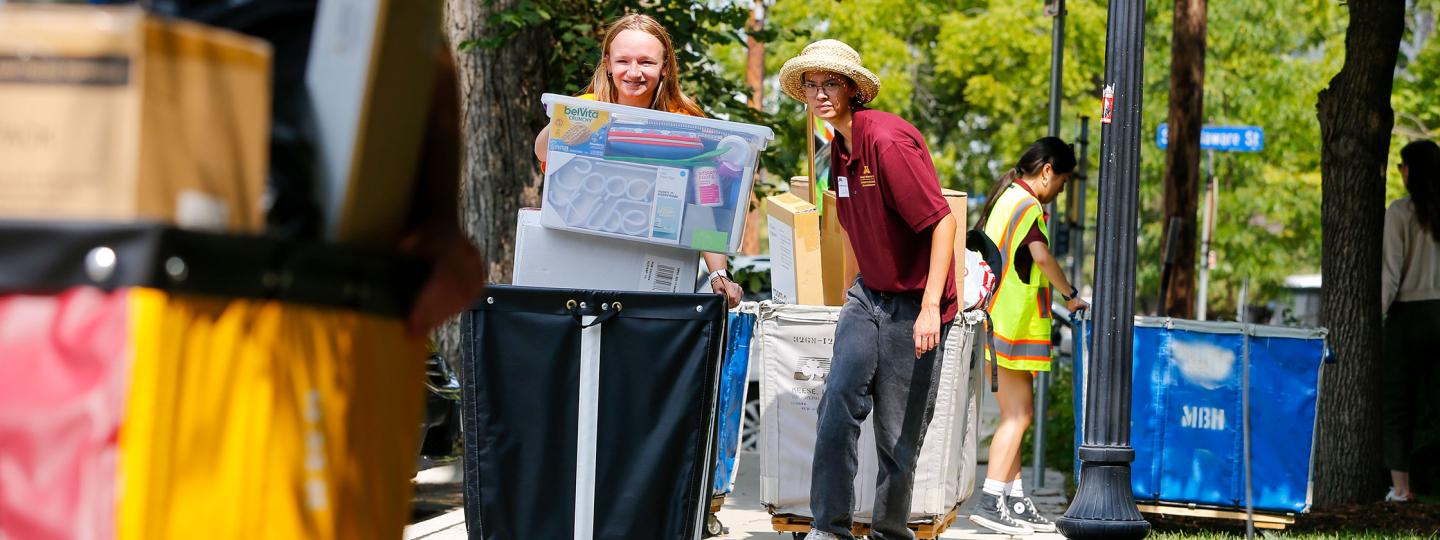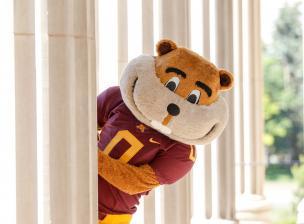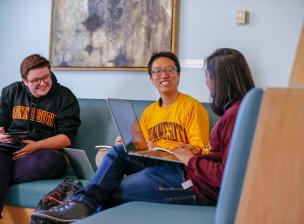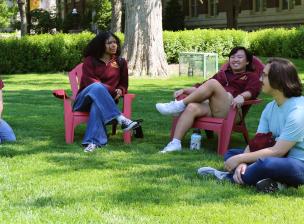
What to Bring
Pack smart, bring less.
Your residence hall or apartment is going to be your new home for the coming year. We want you to love it, but space is limited.
The number one thing we hear each year is "I brought too much!" Focus on only bringing essentials when you move in—things like bedding, bathroom supplies, tech gear, and health and wellness items. You can always buy/bring other things in later after you know how much space you have.
If you will have roommate(s), you should contact them to plan ahead to talk about what you are each planning to bring. This will allow you to avoid unnecessary duplication meaning you will save space AND money.
Don’t bring too much, and think sustainably. Leave yourself room to assess, add, and edit once you’ve got the essentials in place. Try packing your items in cardboard and using reusable bins or laundry baskets to reduce waste. It will also be helpful for you to create a list of things you will want to buy after you move in.
What's In Your Space
All of our buildings/rooms are not the same (review your building's webpage to learn about any additional amenities you'll have), but all of our units include the following items:
- Extra-long twin bed (80 inches, except in Radius and Keeler)
- Closet/wardrobe and dresser
- Desk and chair
- TV and internet connections (cables are not provided, so review the Tech section to know what you should bring)
- Window coverings (blinds or drapes)
- Smoke detectors and sprinklers. Note: do not hang items or bump the sprinklers. They are sensitive, so they may go off if disturbed.
- Trash and recycling containers -- you will need to bring your own 8-gallon trash bags
Essentials And Suggestions
Consider bringing:
- Pillows and pillowcases
- Comforter and/or blanket. Note: the temperature in our buildings can vary throughout the year.
- Sheet sets and mattress pad/topper
- All Residence Halls and Wilkins/Yudof Apartments: Twin XL sheets
- Radius Apartments: Private room - standard full size; shared room - standard twin
- Keeler Apartments: Standard full
Bed Configuration
As noted above, most of our rooms have Twin XL beds. These beds are standard in many college residence halls, so the correct-sized sheets should be available for sale in stores during the summer.
Our standard beds have up to 27 inches of storage space below them. Many residents choose to loft or bunk the bed(s) in their room so they can have additional storage/floor space.
Please note: There are some rooms where the beds cannot be changed due to space limitations. We have a list of these Exceptions on our Lofting & Beds webpage, so incoming residents will want to review this webpage after receiving their room assignment.
Consider bringing:
- Towels
- Washcloths
- Bathrobe
- Shower shoes
- Shower caddy
- Toiletries, such as toothbrush, toothpaste, dental floss, body soap, deodorant, shampoo/conditioner, brushes/combs
- Hairdryer and other styling tools
Consider bringing:
- Computer, laptop, tablet
- Ethernet cord -- 14-foot minimum length, Housing does not have cables available
- Mobile phone
- Headphones
- Charging cords, cables, and adapters
- Television, either with streaming capability or you will need to bring a TV with a cable
- Gaming console
- UL-listed extension cords/surge protectors
- Alarm clock
What NOT to Bring
- E-Scooters, E-Bikes, and Hoverboards: They are a significant fire hazard and can cause significant damage to the carpet and walls, so they are not allowed inside our buildings. They should only be brought to campus if they can be charged and stored outside the building.
- WiFi router: Residents are not allowed to use a personal router to expand the WiFi network provided in our buildings. This is a violation of University policy as it reduces the overall quality of WiFi for you and your neighbors. Each resident has high-speed internet access, including one wired connection in their room and access to WiFi.
- Personal printer: We strongly discourage residents from bringing their own printer. They take up a lot of space, and WiFi printers can interrupt the wireless service. All of our buildings have Tech Lounges where you can print efficiently and cheaply (it is only $0.10 per page to print in black and white and $0.50 per page in color). If you do bring a printer, you should turn off its wireless capacity and use a cord to connect your computer and printer, instead.
- Smart/“Internet of Things” (IoT) devices: Our WiFi network can support a variety of devices including laptops and gaming consoles. Some types of smart/IoT devices designed for home use will not work (such as smart light bulbs). If you wish to buy these, we strongly encourage you to wait until after you arrive so that they can be returned if they do not work. Due to the rapidly growing number of devices, Housing does not have a list of specific devices that will or will not work on our network.
- TV set-top box: UMN-TV provides more than 120 channels of digital content through cable and over 80 channels streaming online. TV set-top boxes are not required. UMN-TV can be streamed on computers, Roku, FireTV, and iOS/Android devices with the Apogee Stream2 app.
Consider bringing:
- Personal prescriptions
- Glasses and contact lens supplies
- Over-the-counter medications
- First aid kit
- Hand sanitizer
- Tissues
- Sunscreen
Health Advocates
There are student Health Advocates (HA) in our residence halls and apartments. HAs are student volunteers trained by Boynton Health to help students with health questions and concerns. They can connect you with campus resources and provide a variety of basic health items like cough drops, ibuprofen, acetaminophen, bandages, condoms, and pregnancy tests.
Are you interested in being a Health Advocate? Boynton Health is currently recruiting volunteers, and they will provide training. Learn more on the Boynton Health website
All of our buildings have washing and drying machines that residents can use at no additional cost.
Consider bringing:
- Laundry basket/bag
- High-Efficiency laundry detergent (detergent pods are not recommended)
- Dryer sheets and fabric softener
- Clothes hangers
- Collapsible drying rack
- Clothes iron, ironing board/mat
- Cleaning supplies
- Trash bags for the provided trash can (8 gallon bags recommended)
What do I clean?
Our staff clean and maintain the common areas of our buildings, but residents are responsible for cleaning their own spaces. For those who have them, this includes cleaning the private/semi-private bathroom, and apartment residents must coordinate with their roommate(s) to clean the shared areas of the apartment, like the kitchen.
Cleaning equipment like vacuums, brooms, dustpans, and buckets are available for checkout at your building's Information Desk. Residents must bring their own cleaning liquids/solutions.
Consider bringing:
- Reusable bowl, plate, cup/mug, and utensils
- Reusable food-storage containers
- Reusable water bottle and travel mug
- Drip coffee/espresso maker, electric kettle with automatic shutoff
- Mini blender
- Air popcorn maker
Residents moving into an apartment can also bring additional cooking supplies.
Fridges and Microwaves
- Residence Halls: Students in residence halls may bring a microwave (700 watts or less) and/or mini-refrigerator (4.3 cubic feet or less).
- Apartments: All of our apartments have refrigerators. There are microwaves provided in Keeler, Radius, Yudof, and the efficiency units in Wilkins (but not the 1- and 2-bedroom apartments). You can review your building’s webpage for more information about the kitchen in your unit.
Community Kitchens
All buildings (except Keeler and Wilkins apartments) have community kitchen areas with a stovetop, oven, microwaves, sink, and counter space. Cooking equipment is available to check out from your building's Information Desk.
Prohibited Appliances (Residence Halls only)
Appliances with open heating elements are not allowed in residence halls, including electric grills and all-in-one makers, e.g. waffle iron, griddle, panini/pizza/quesadilla maker, toaster/toaster oven, hotplate, oil popcorn maker, air fryer, slow cooker, rice cooker, pressure cooker, etc.
Note: These items are allowed in the kitchen area of on-campus apartments.
Consider bringing:
- Umbrella
- Winter coat, hat, gloves
- Wool socks
- Waterproof/resistant shoes or boots
- Shoe/boot tray
Preparing for Changing Temperatures
While we are most known for our winters, you'll experience all the seasons in Minnesota. The temperatures can range from 90s in the summer to sub-zero temperatures throughout the winter months.
The temperatures can also vary inside our buildings, particularly during the fall and spring months. Residents should plan for clothing items you can easily layer as it gets colder, and shed when you're warm.
Outdoor Gear
We recommend you not bring your skis, snowboards, or equipment for other sports or outdoor activities since there is limited space to store them.
University Recreation and Wellness offers Outdoor Gear Rentals right on campus -- past students have loved it! Our Information Desks also have a supply of select outdoor gear.
Consider bringing:
- Academic supplies -- backpack, pens, highlighters, notebooks, textbooks, etc.
- Photo ID, U Card, credit/debit card, insurance cards, emergency contact information
Note: Are you planning to get a job during the school year? You will need certain identification to begin employment such as your social security card, birth certificate, and/or work authorization documents. You should bring these with you and store them in a secure location. - Desk/bedside lamps with LED or CFL light bulbs
- Fan, for air circulation and white noise
- Room decor such as a doormat, string lights, area rugs, art, throw pillows, and options for hanging them that will not damage the wall (review the warning below)
- Board games, books, or other entertainment. Some are available to check out at your Information Desk!
- Yoga mat or other wellness/workout items
- Bike, helmet, headlight, and a U-lock.
Note: You should bring an inexpensive bike to campus. Parking & Transportation Services has information about locking your bike, and residents in Minneapolis can register their bike with the city to make it easier for police to recover it if it is stolen.
Warning
You are responsible for ensuring you use adhesives that can be removed without damaging the walls. When looking at adhesive options, read the labels to find items with words like “damage-free” or “removable.” It is also important that you review and follow the directions provided.
In particular, DO NOT use the adhesive backing that comes with LED light strips. It will significantly damage the walls when you remove it while preparing to move out — trust us, we’ve repeatedly seen the damage left behind.
Note: You may be charged when you move-out if you use adhesives that significantly damage the walls. Past residents have been charged $200 or more due to the time and expense that is necessary to repair the walls.
Prohibited Items
🚫 Appliances with open heating elements are not allowed in residence halls, including electric grills, toasters, and hotplates. Review the Kitchen & Appliances section above
🚫 Alcohol or alcohol containers -- review the Community Behavioral Standards to learn about alcohol use
🚫 Illegal drugs, cannabis, drug paraphernalia, and hookahs. Medical cannabis use is prohibited on University property
🚫 Tobacco, vapes, and electronic cigarettes. These may be stored but not used on campus, review the University’s Share the Air policy for more information
🚫 Firearms, weapons, fireworks/explosives
🚫 Candles, incense, and electric fireplace
🚫 Pets. Fish in up to a 10-gallon tank, service animals, and support animals approved through the Disability Resource Center are permitted
🚫 Wireless routers
🚫 Air conditioners
🚫 Space heaters and electric dryers
🚫 Halogen lamps
🚫 Hoverboards, E-Bike, E-Scooters
🚫 We also strongly discourage students from bringing personal printers or Smart/IoT devices designed for home use (review the Tech section above)
Renter's Insurance
Each year we have a small number of incidents where a student’s actions result in significant damage to their belongings, others’ belongings, and/or the building. Examples of this include:
- Broken sprinkler heads due to a student 1) hitting it with a thrown object or 2) hanging something off it
- Burst pipes due to windows being left open during the winter and the pipes freezing
The University does not provide insurance or cover the damage costs for your personal property in these types of situations. You should check whether your or your family’s homeowner’s insurance can cover your items. If not, you may want to speak with your provider about purchasing renter’s insurance. It can be inexpensive, and many companies provide discounts for customers who have more than one type of insurance.


